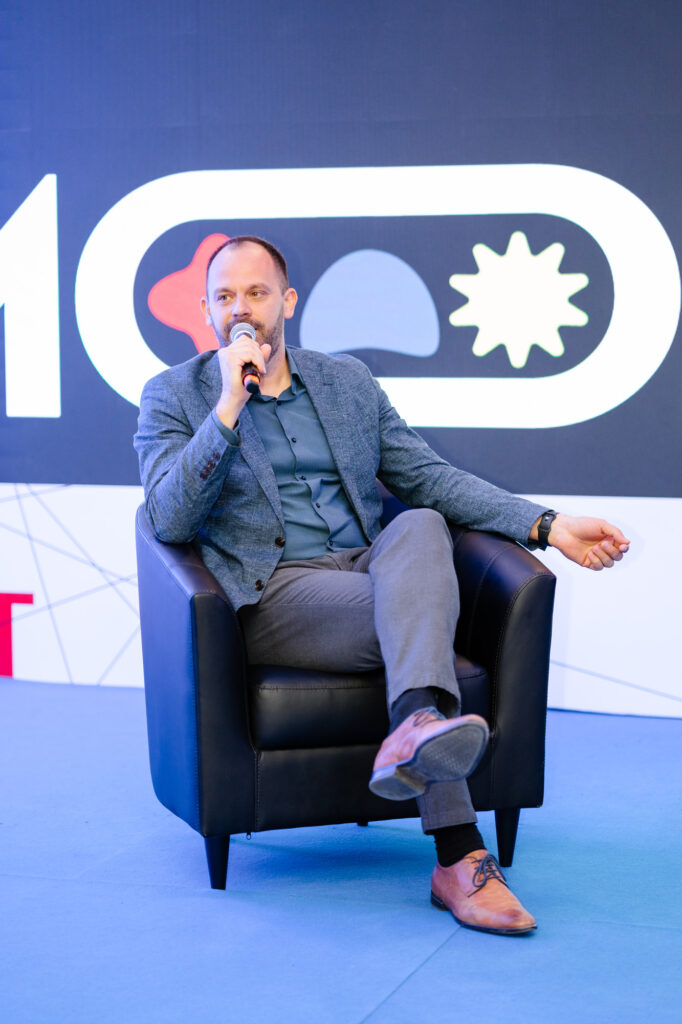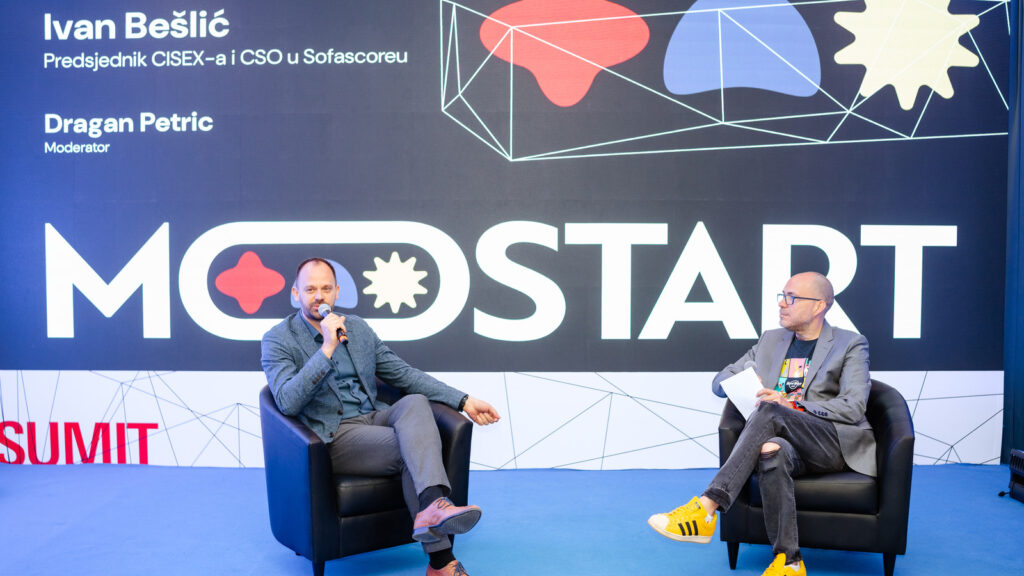The tech world isn’t used to standing still. But for the past two years, the IT sector in our region has done just that. Global AI races are accelerating and countries around the world are forming ministries to shape their digital futures. That’s exactly why this question: Do we need a Ministry of Artificial Intelligence?, sparked such interest at the MoStart conference in Mostar, where Sofascore’s CSO Ivan Bešlić took part in a fireside chat on the topic.
As a long-time leader in the regional IT scene and current president of the association Unit (formerly CISEx), Bešlić brought his perspective on the role of the private sector, the state’s blind spots, and the power of data.
“What You’re Doing Now, You Probably Won’t Be Doing in Two Years”
Bešlić kicked off his talk with a personal story.
“Twenty years ago, my brother and I picked corn by hand. When we moved away, my dad bought a machine for it. That’s my message – what you’re doing today, you definitely won’t be doing in 20 years. Probably not even in two or three.”
That evolution, from manual labor to automation, is the same logic now with discussions about artificial intelligence. For Bešlić, the key takeaway is clear:
“It’s not a cliché to say you either invest in yourself or you don’t. And if you don’t, you’ll get left behind.”

A Sector at a Crossroads
From growth to stagnation. Unit, much like the entire IT industry, is at a critical crossroads. The hiring booms have cooled, and easy scaling is no longer guaranteed. But Bešlić believes that this slowdown is not a crisis, it’s a wake-up call.
“I think it’s healthy. We’ll finally reassess what we’re doing, focus on inovations and stop wasting time on things that don’t make sense.”
Still, the question remains: can IT become the next tourism, Croatia’s so-called “golden goose”? Bešlić believes it’s possible, but not without rethinking the way the public and private sectors interact.
“We want to see IT reach the same level as tourism. Some see AI as a threat, but I see it as a massive opportunity, for us and for the global economy.”
A Ministry of AI? Not Yet – But the Dialogue Must Start
So, should the region create a Ministry of Artificial Intelligence?
Bešlić doesn’t think we’re there yet.
“Companies need to gather insights and give them to the state. But right now, we don’t have an open dialogue. We treat the government like a stepmother. It’s our government. And we’re too afraid to give credit when it does something good. That mindset needs to change.”
He sees the current wave of innovation as a unique chance for the private sector to lead by example, while encouraging the government to react faster. After all, data from 2024 won’t be available until it’s too late.
“The private sector moves faster. The state reacts to data from last year, and by the time it responds, the situation has changed again. That’s why open dialog is something we must have.”

The Minister of Justice, Public Administration and Digital Transformation, Damir Habijan, visited the company Sofascore and Unit couple of weeks ago. You can read about it here.
What Would a Ministry of AI Actually Do?
Bešlić is cautious about adding layers of bureaucracy, especially if they sideline those doing the actual work.
“Let the next generation decide if they need a ministry. I’m not a fan of more administration while the private sector gets ignored.”
Instead, he emphasizes collaboration, like the kind at events such as MoStart.
“Conferences like this are a great way to connect universities, students, and government. That’s the kind of dialogue we need.”
At Sofascore, that dialogue is already underway. Employees lecture at universities, and the Sofascore Academy creates a bridge between real-world experience and academic learning.
The AI Opportunity Starts with Data, Not Just Servers
When asked about the future of artificial intelligence, Bešlić made a clear distinction: the conversation needs to shift from servers and algorithms to what truly powers AI – data.
“The richest country in the world can’t do anything without data. We should have started collecting it yesterday. If you can imagine the kind of data you’ll need, start collecting it now.”
This insight mirrors Sofascore’s own product philosophy. The platform is built on structured, real-time data that fuels smarter fan experiences, and even smarter business decisions.
Bešlić also touched on global dynamics, including tariffs, trade wars, and expansion into the U.S. market.
“It doesn’t matter who’s in power or what’s decided. What matters is recognizing opportunities when they arise. I read that European components are now cheaper than Chinese ones. Base your decisions on current conditions. That’s what we do at Sofascore, we didn’t overanalyze why Messi scores, we just asked how we could make the most of it.”
With the 2026 FIFA World Cup approaching, Sofascore is preparing for a strong push into the U.S. market – carefully watching how international politics might impact their path, but not waiting around to react.

The Only Way Forward: Dialogue Without Division
As the session wrapped up, Bešlić offered one final piece of advice:
“We need dialogue. Let’s stop calculating who’s from which party. Talk to build a better future. We must close the gap between a government that doesn’t see right away what’s happening in the private sector – and a private sector that doesn’t want to engage with government.”
In the end, the question isn’t just whether we need a Ministry of AI. It’s whether we’re ready to talk, to share data, to bridge silos, and to invest in a smarter, faster, more connected future.
